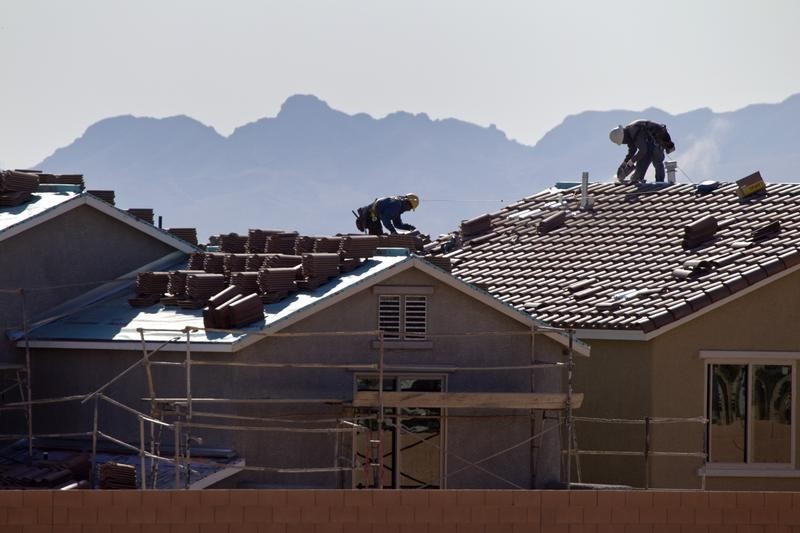By Julie Gordon
VANCOUVER, April 12 (Reuters) - An advisory board tasked
with reviewing real estate practices in British Columbia appears
set to recommend sweeping changes to the province's rules,
including a "significant" boost in penalties for rule breaches
and unethical behavior.
In a letter to British Columbia's Real Estate Council,
independent advisory group chair Carolyn Rogers noted current
penalties have fallen so far behind market conditions that they
have become completely ineffective.
The letter, released on Tuesday, did not include formal
recommendations. A final report is due in June.
The real estate industry has come under scrutiny following
numerous recent media reports on predatory practices by some
agents and brokers in the province's red hot property markets.
Housing prices are skyrocketing in British Columbia,
particularly in Greater Vancouver, where the cost of a typical
detached home jumped 47.6 percent in the last three years,
hitting C$1.34 million in March.
"It's not just as simple as making the penalties bigger,"
Rogers told reporters on a conference call, adding that fines
must be larger than potential profits to discourage misconduct.
"In a market like this, where you're selling
multimillion-dollar homes, it would be difficult to create a
penalty regime that would keep up and ensure those penalties
don't continue being a 'cost of business.'"
Rogers said her committee is also considering a ban on dual
agency, where an agent represents both the buyer and seller in a
particular deal, and will monitor upcoming changes to rules on
contract assignments, also known as "shadow flipping."
The province pledged last month to crack down on "shadow
flipping," where a party agrees to buy a property for a set
price, but before the sale closes, they resell the contract to a
third party for a higher price.
The advisory board also expects to make recommendations on
regulatory structure, having noted that some regional real
estate boards have taken on a "quasi regulatory" role, dealing
with consumer complaints despite not having a transparent
process for reporting back to the public.
The Real Estate Council of British Columbia, which is the
legal regulator for the industry, should be dealing with
complaints and agent discipline, the letter noted.
- English (USA)
- English (UK)
- English (India)
- English (Australia)
- English (South Africa)
- English (Philippines)
- English (Nigeria)
- Deutsch
- Español (España)
- Español (México)
- Français
- Italiano
- Nederlands
- Português (Portugal)
- Polski
- Português (Brasil)
- Русский
- Türkçe
- العربية
- Ελληνικά
- Svenska
- Suomi
- עברית
- 日本語
- 한국어
- 简体中文
- 繁體中文
- Bahasa Indonesia
- Bahasa Melayu
- ไทย
- Tiếng Việt
- हिंदी
British Columbia real estate review panel eyes rule changes, bigger fines
Published 2016-04-12, 09:14 p/m
British Columbia real estate review panel eyes rule changes, bigger fines

Latest comments
Install Our App
Risk Disclosure: Trading in financial instruments and/or cryptocurrencies involves high risks including the risk of losing some, or all, of your investment amount, and may not be suitable for all investors. Prices of cryptocurrencies are extremely volatile and may be affected by external factors such as financial, regulatory or political events. Trading on margin increases the financial risks.
Before deciding to trade in financial instrument or cryptocurrencies you should be fully informed of the risks and costs associated with trading the financial markets, carefully consider your investment objectives, level of experience, and risk appetite, and seek professional advice where needed.
Fusion Media would like to remind you that the data contained in this website is not necessarily real-time nor accurate. The data and prices on the website are not necessarily provided by any market or exchange, but may be provided by market makers, and so prices may not be accurate and may differ from the actual price at any given market, meaning prices are indicative and not appropriate for trading purposes. Fusion Media and any provider of the data contained in this website will not accept liability for any loss or damage as a result of your trading, or your reliance on the information contained within this website.
It is prohibited to use, store, reproduce, display, modify, transmit or distribute the data contained in this website without the explicit prior written permission of Fusion Media and/or the data provider. All intellectual property rights are reserved by the providers and/or the exchange providing the data contained in this website.
Fusion Media may be compensated by the advertisers that appear on the website, based on your interaction with the advertisements or advertisers.
Before deciding to trade in financial instrument or cryptocurrencies you should be fully informed of the risks and costs associated with trading the financial markets, carefully consider your investment objectives, level of experience, and risk appetite, and seek professional advice where needed.
Fusion Media would like to remind you that the data contained in this website is not necessarily real-time nor accurate. The data and prices on the website are not necessarily provided by any market or exchange, but may be provided by market makers, and so prices may not be accurate and may differ from the actual price at any given market, meaning prices are indicative and not appropriate for trading purposes. Fusion Media and any provider of the data contained in this website will not accept liability for any loss or damage as a result of your trading, or your reliance on the information contained within this website.
It is prohibited to use, store, reproduce, display, modify, transmit or distribute the data contained in this website without the explicit prior written permission of Fusion Media and/or the data provider. All intellectual property rights are reserved by the providers and/or the exchange providing the data contained in this website.
Fusion Media may be compensated by the advertisers that appear on the website, based on your interaction with the advertisements or advertisers.
© 2007-2024 - Fusion Media Limited. All Rights Reserved.